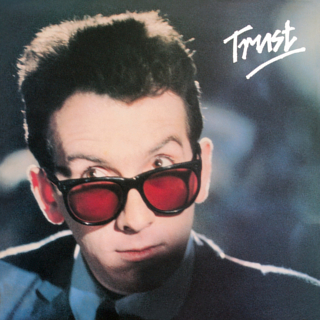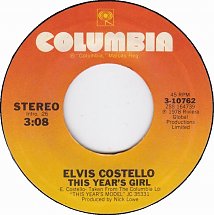
Get Happy!! is the fourth studio album by English singer-songwriter Elvis Costello, and his third with the Attractions—keyboardist Steve Nieve, bassist Bruce Thomas and drummer Pete Thomas. It was released on 15 February 1980 through F-Beat Records in the United Kingdom and Columbia Records in the United States. Produced by Nick Lowe and engineered by Roger Béchirian, the sessions began in London but moved to the Netherlands after Costello found the material derivative of his previous album Armed Forces (1979). The sessions were problematic but amassed a large number of songs; the final album contains 20 tracks across a single LP.

Trust is the fifth studio album by the English singer-songwriter Elvis Costello, and his fourth with the Attractions—keyboardist Steve Nieve, bassist Bruce Thomas and drummer Pete Thomas. It was released on 23 January 1981 through F-Beat Records in the United Kingdom. His fifth consecutively produced album by Nick Lowe, who was assisted by engineer Roger Béchirian, the album was recorded in London from October to November 1980 between DJM and Eden Studios. The sessions were riddled with alcohol and drug issues and tensions were high between the band members. Squeeze vocalist Glenn Tilbrook and the Rumour guitarist Martin Belmont made guest appearances on "From a Whisper to a Scream".

"Oliver's Army" is a song written by Elvis Costello and performed by Costello and the Attractions, from the former's third studio album Armed Forces (1979). The song is a new wave track that was lyrically inspired by the Troubles in Northern Ireland and includes lyrics critical of the socio-economic components of war. Costello had travelled to Northern Ireland and was influenced by sights of British soldiers patrolling Belfast. Musically, the song features a glossy production and a keyboard performance inspired by ABBA, creating a juxtaposition between the lyrics and music that both critics and Costello have pointed out.

"Radio Radio" is a song written by Elvis Costello and performed by Elvis Costello and the Attractions. The song originated as a Bruce Springsteen-inspired song called "Radio Soul" that Costello had written in 1974. In 1977, Costello reworked the song to feature a more aggressive arrangement and more direct, sarcastic lyrics that criticized the commercialism of English radio. Costello and the Attractions recorded the song around the time of his second album, This Year's Model.

"Alison" is a song written by and first recorded by Elvis Costello in 1977 for his debut album My Aim Is True on Stiff Records. Costello claimed the song was written as an ode to a woman he saw working at a supermarket, though he has remained vague on the meaning. Though Costello's single never charted, it has become one of his most famous songs.

Ten Bloody Marys & Ten How's Your Fathers is an Elvis Costello and the Attractions album comprising tracks not previously released on albums. It is largely made up of B-sides, but features three previously unreleased recordings. It was released only in the UK, initially only on cassette, though later in other formats.

"Accidents Will Happen" is a song written by Elvis Costello and performed by Elvis Costello and the Attractions. It first appeared on the 1979 album Armed Forces. Costello wrote the song about his many infidelities during this period of his life, including an encounter Costello had with a taxi driver in Tucson, Arizona. The song originally featured a piano-centered arrangement and was inspired by songs such as "Anyone Who Had a Heart" and "Walk Away Renée".

"I Can't Stand Up for Falling Down" is a song written by Homer Banks and Allen Jones. Originally recorded by soul duo Sam & Dave in 1967, the song was famously covered by new wave musician Elvis Costello with his backing band the Attractions in 1980 for their album Get Happy!!.

"Man Out of Time" is a song written by new wave musician Elvis Costello and performed by Elvis Costello and the Attractions on their 1982 album, Imperial Bedroom. With lyrics detailing a political scandal, "Man Out of Time" features a lush arrangement that was a conscious departure from the aggressive style of Costello's previous work.

"Girls Talk" is a new wave song written by Elvis Costello and first recorded by Dave Edmunds in 1978.

"(The Angels Wanna Wear My) Red Shoes" is a song written and recorded by Elvis Costello for his 1977 debut album My Aim Is True. Written by Costello on a train ride to Liverpool in 1976, the song features lyrics, according to Costello, about "romantic disappointment". The song features Byrds-inspired music with an intro contributed by John McFee of Costello's then-backing band Clover.

"(I Don't Want to Go to) Chelsea" is a song written by new wave musician Elvis Costello and recorded by Costello with his backing band the Attractions. The song appeared on Costello's 1978 second album, This Year's Model. Written by Costello while working as a computer programmer, the song was lyrically inspired by films Costello had been watching as well as childhood trips to Chelsea. Musically the song featured influence from bands such as the Who and the Kinks and is notable for Bruce Thomas's prominent bassline.

"New Amsterdam" is a song written and performed by new wave musician Elvis Costello on his 1980 album, Get Happy!! Written about the New World and New York, the recording of the song that appears on Get Happy!! was a demo that Costello had recorded in Pimlico.

"You Little Fool" is a song written by new wave musician Elvis Costello and performed by Elvis Costello and the Attractions on their 1982 album, Imperial Bedroom. The lyrics detail a teenage girl's romantic encounter with an older man.

"The Only Flame in Town" is a song written by new wave musician Elvis Costello and recorded by Costello with his backing band the Attractions. The song appeared on Costello's 1984 album, Goodbye Cruel World. Originally written in the style of a classic torch song, "The Only Flame in Town" was reworked by producers Clive Langer and Alan Winstanley in a more pop-friendly style. This final version features Daryl Hall of Hall & Oates on backing vocals.

"I Want You" is a song written by Elvis Costello and recorded with his backing band the Attractions. It was released on his 1986 album Blood & Chocolate.

"Brilliant Mistake" is a song written and performed by new wave musician Elvis Costello that was first released on his 1986 album King of America. Written about Costello's experiences in America, the song features introspective lyrics and a performance from the Confederates, who performed on the track after his usual backing band the Attractions could not perform to Costello's liking.

"This Year's Girl" is a song written by new wave musician Elvis Costello and performed by Costello and the Attractions for his 1978 album This Year's Model. Inspired by the Rolling Stones song "Stupid Girl", the song's lyrics criticizing fashion saw some critics allege misogyny, a theme which Costello strongly denied was present in the song in subsequent interviews.

"Watch Your Step" is a song written by new wave musician Elvis Costello and performed by Costello and the Attractions on their 1981 album, Trust. Originating from lyrics he wrote as a 20-year-old, "Watch Your Step" was inspired by Costello's experiences on tour as well as by dub music. The song was originally a louder rock song, but the final released version is slower and quieter.
"Riot Act" is a song written by new wave musician Elvis Costello and performed by Costello and the Attractions for his 1980 album Get Happy!!. Costello wrote the song as a response to the controversy that had surrounded him in his professional and personal life, particularly relating to his incident in Columbus, Ohio. Recorded originally as a stripped-down acoustic demo, the song was fleshed out in the studio with the Attractions.



















